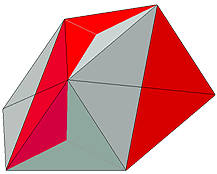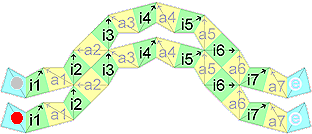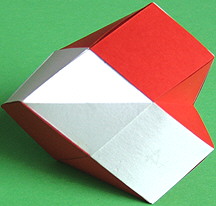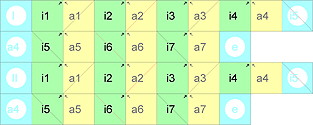Johnson
Polyhedron #26
(gyrobifastigium)
(2 compound tri-
angular prisms)
8 vertices
14 edges
8 faces
4 equilateral
triangles (4 tr.)
4 squares (4 sq.) |
 | vertex
2 paper strips
2 x 1/3 tr.
5 x 2/3 tr.
8 x 1/2 sq. |

pattern download
2 paper strips, 2653 x 1137 pix, 128 kb: str2.gif |
plaiting scheme:
| |
a1 | a2 | a3 | a4 | a5 | a6 | a7 | | I |
↑↑ i5 I | ↓↑ i6 I | ↑↑ i7 I | ↓↑ i3 II |
↑↑ i1 II | ↑↑ i4 II | ↓↑ i2 II | | II |
↑↑ i5 II | ↓↑ i6 II | ↑↑ i7 II |
↓↑ i3 I | ↑↑ i1 I | ↑↑ i4 I |
↓↑ i2 I |
|
modified JP26
12 vertices
22 edges
12 faces
8 trapezoids (6 tp.)
4 rectangular
isoceles
triangles (4 tr.) |
 | plain
2 paper strips
each divided
into 2 parts
4 tr.
4 tp.
4 x 1/4 tp.
4 x 3/4 tp. |

pattern download
2 paper strips, 2784 x 1116 pix, 96 kb: wst2.gif
red lines: mountain folding
|
plaiting scheme: see above.
The quadrangles of the strips for the solid JP26 above were replaced by squares ("wrapping").
Remark 1: if a1, a3, i5, and i7 are folded as mountain along the arrows, and the grey lines as valley, the result is
a polyhedron with 12 vertices, 30 edges and 20 faces (8 squares, 12 tr.), |
 |
Remark 2: If a2 is folded as valley along the arrow and i6 as valley across the arrow, then the result is a solid, which seems to be
konvex. |
|







